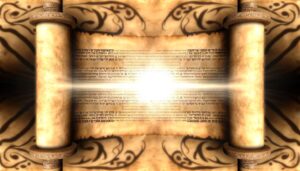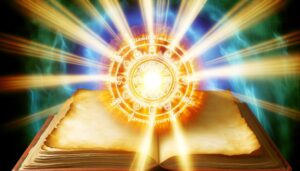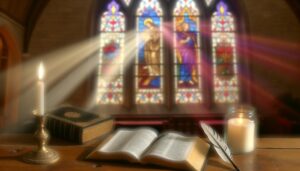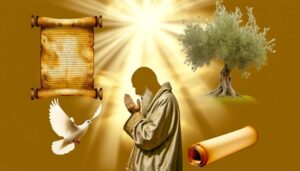Meaning Of Shadrach In The Bible: Faith and Courage
In the Bible, the name Shadrach, originally Hananiah, reflects the Judaean exile’s cultural assimilation into Babylonian society. Shadrach, meaning “command of Aku,” signifies the struggle between enduring faith in God and the prevalent pagan practices, as depicted in the Book of Daniel.
Known for his defiant faith, Shadrach, along with his companions, miraculously survived a fiery furnace for refusing to worship King Nebuchadnezzar’s golden statue (Daniel 3:12-27). This account profoundly illustrates unwavering commitment to God, His omnipotence, and divine protection, instilling a powerful lesson in faith that transcends generations.
For a deeper understanding, one can discover additional insights about his story.
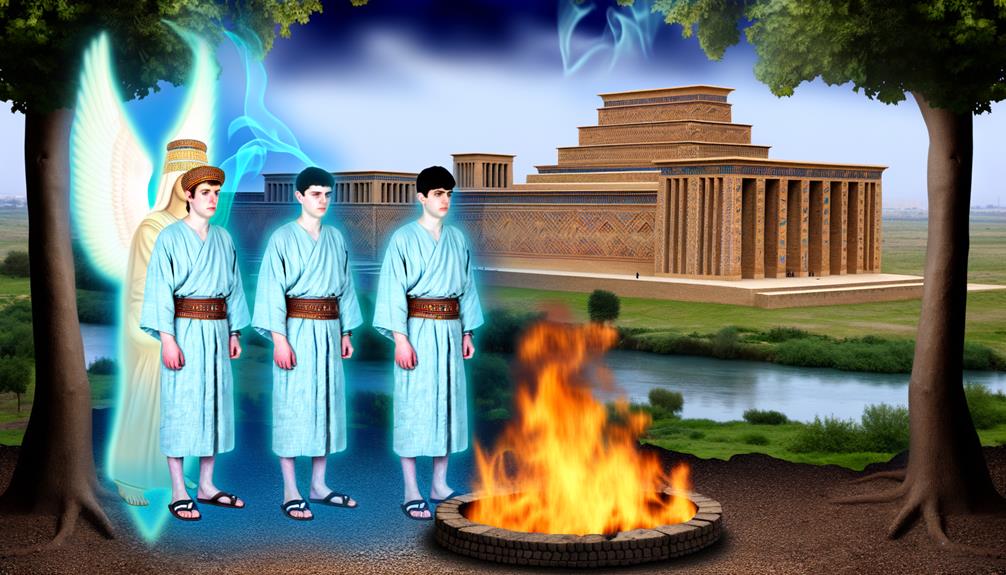
Biblical Meaning of Shadrach: Faith, Courage, and Divine Protection
| Aspect | Details |
|---|---|
| Name | Shadrach |
| Original Name | Hananiah (Hebrew name) |
| Meaning | Command of Aku (Babylonian moon god) |
| Biblical Reference | Daniel 1–3 |
| Role in Scripture | One of the three Hebrew men thrown into the fiery furnace |
| Spiritual Symbolism | Faith under pressure, courage, divine protection, loyalty to God |
| Key Event | Survived the fiery furnace without harm through God’s intervention |
Origin of the Name Shadrach
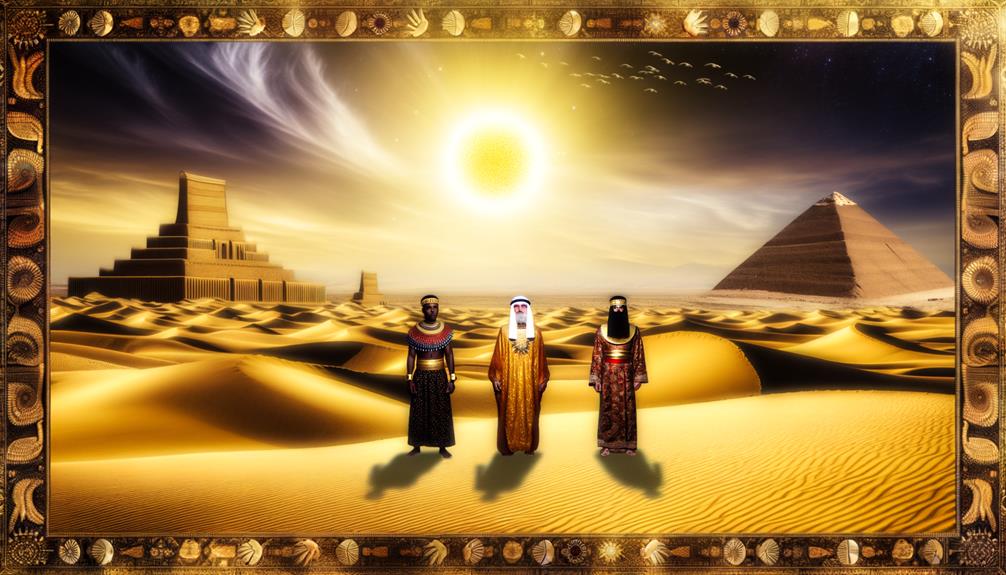
The name Shadrach, which appears in the Book of Daniel in the Hebrew Bible, is of Babylonian origin, deriving from the Akkadian language.
Historically, Shadrach was the Babylonian name given to Hananiah, one of the Judean youths exiled to Babylon. The name is believed to be associated with the Babylonian god Marduk, indicating a significant shift from his Hebrew name, which means ‘Yahweh is gracious.’
This renaming was part of a broader Babylonian practice of assimilating captives by changing their identities and religious affiliations. Theologically, this highlights the tension between faithfulness to the God of Israel and the pressures of a foreign culture.
Scriptural references to Shadrach can be found in Daniel 1:7 and throughout the subsequent chapters.
Shadrach’s Role in the Bible
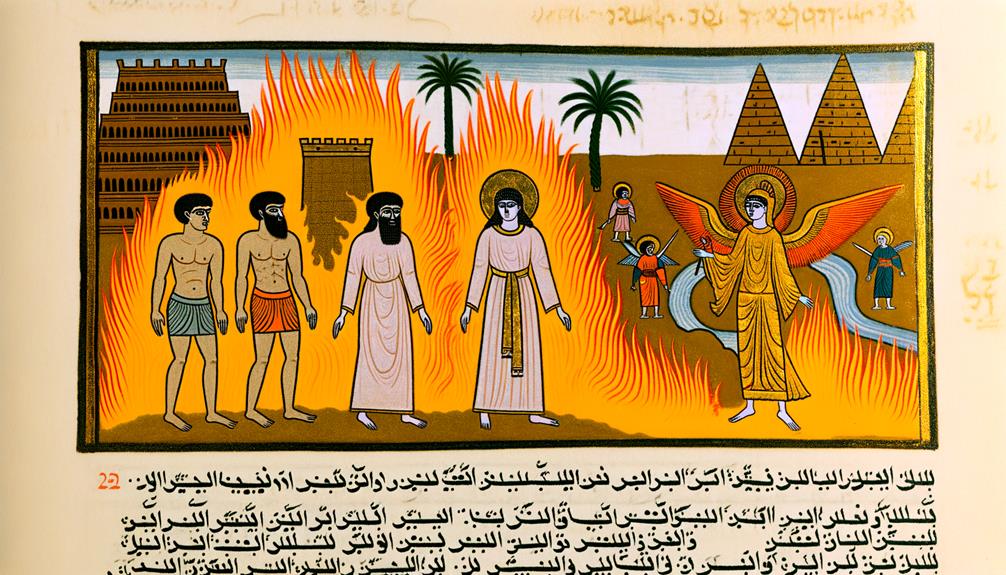
Shadrach, alongside his companions Meshach and Abednego, plays a pivotal role in the Book of Daniel as exemplars of steadfast faith in the face of persecution, particularly highlighted in the account of the fiery furnace in Daniel 3.
When King Nebuchadnezzar commanded all to worship a golden image, Shadrach refused, demonstrating unyielding adherence to his faith (Daniel 3:12). Their defiance resulted in being cast into a blazing furnace.
Miraculously, they emerged unharmed, signifying divine protection and affirming their unwavering devotion to God (Daniel 3:27).
This episode underscores the themes of divine sovereignty and faithfulness, as Shadrach and his companions serve as enduring symbols of courage and piety amidst adversity.
The Name Change From Hananiah
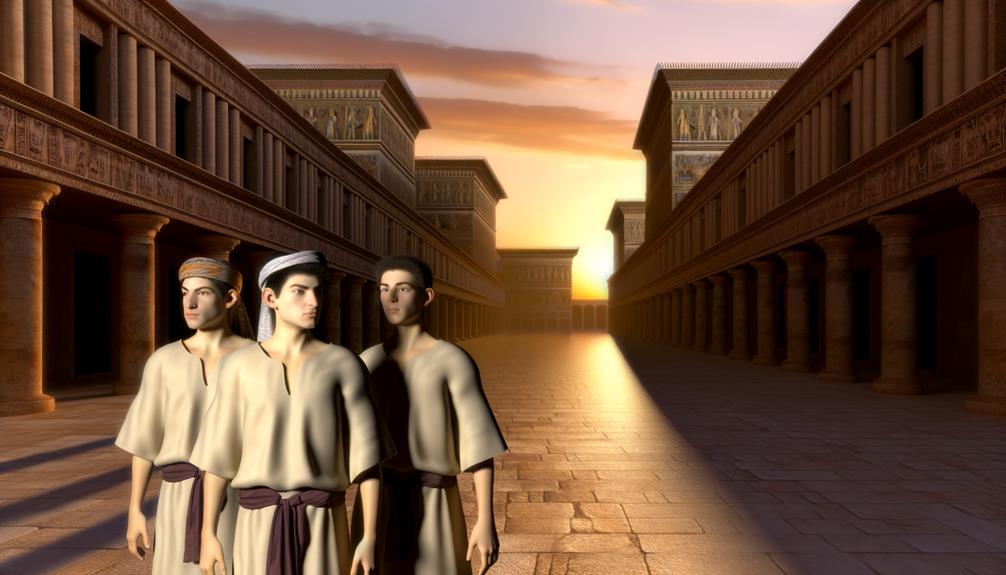
Upon their exile to Babylon, Hananiah and his companions were given new names by the Babylonian court, with Hananiah being renamed Shadrach (Daniel 1:7). This change signified their subjugation and attempt to assimilate them into Babylonian culture.
The renaming was not merely a change of labels but a deliberate effort to strip these young men of their Hebrew identity and heritage. Hananiah, which means ‘Yahweh is gracious,’ was replaced with Shadrach, likely linked to a Babylonian deity, thereby imposing Babylonian religious beliefs.
This act of renaming served as a tool of control and assimilation, reflecting the broader theme of the Israelites’ struggle to maintain their faith and identity in a foreign land (Daniel 1:8-16).
Shadrach and the Fiery Furnace
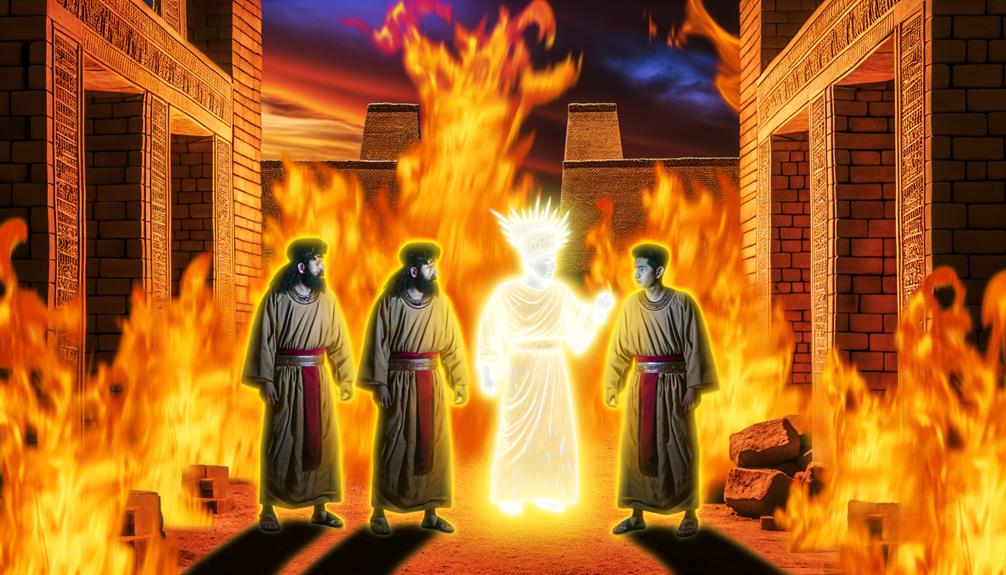
Frequently cited as a demonstration of unwavering faith, the account of Shadrach and the fiery furnace in Daniel 3 vividly illustrates the resolve of Hananiah and his companions to uphold their devotion to Yahweh, even under the threat of death.
King Nebuchadnezzar commanded all to worship a golden image, but Shadrach, Meshach, and Abednego refused, declaring in Daniel 3:17-18 that their God could save them, but even if He did not, they would not serve the king’s gods.
Their defiance led to their being cast into a furnace heated seven times hotter than usual.
Miraculously, they emerged unscathed, accompanied by a divine figure, demonstrating God’s ability to protect and vindicate His faithful servants.
Symbolism of Shadrach’s Faith
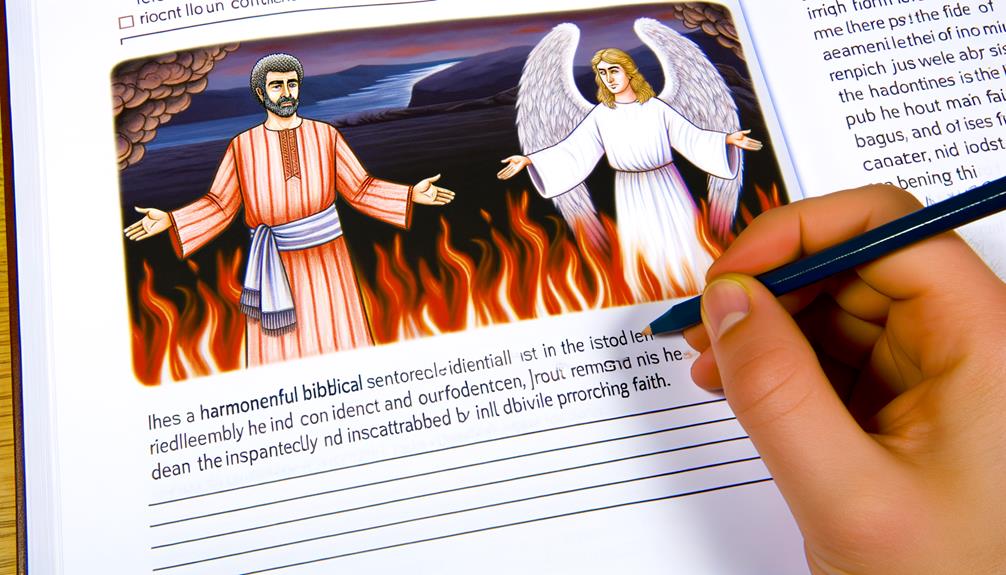
The tale of Shadrach’s unwavering faith serves as a powerful symbol of steadfast devotion and divine deliverance, as illustrated in Daniel 3:17-18.
When faced with the fiery furnace, Shadrach and his companions proclaimed their trust in God’s ability to save them, yet remained resolute even if deliverance did not come. Their faith underscores several key themes:
- Unyielding Commitment: Shadrach refused to bow to Nebuchadnezzar’s idol, exemplifying absolute loyalty to God (Daniel 3:12).
- Divine Protection: The miraculous preservation in the furnace highlights God’s sovereign protection over His faithful (Daniel 3:25).
- Witness to God’s Power: Their deliverance served as a demonstration of God’s omnipotence, leading the king to acknowledge God’s supremacy (Daniel 3:28-29).
This episode encapsulates profound theological insights into faith and divine providence.
Lessons From Shadrach’s Story
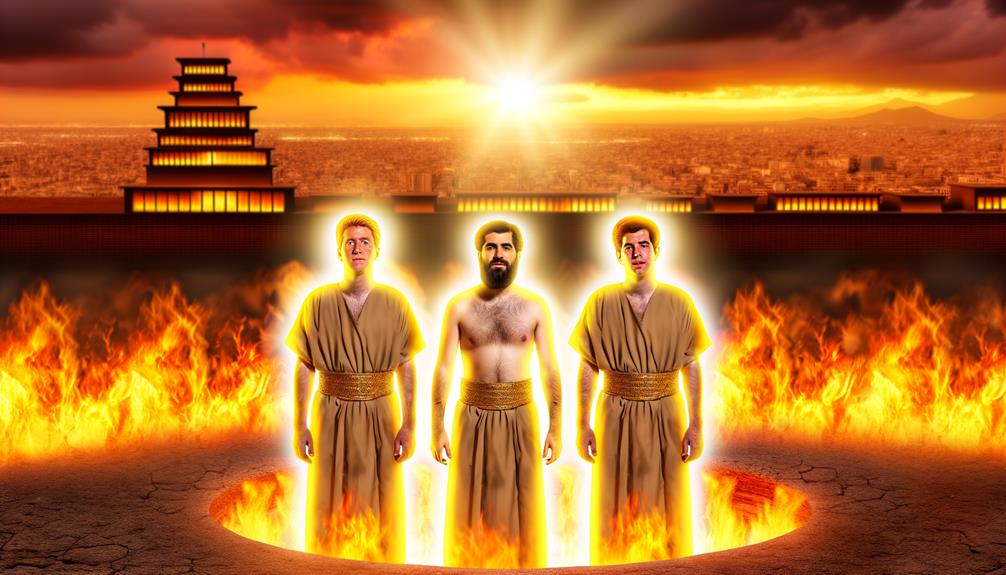
Shadrach’s story offers timeless lessons on the virtues of unwavering faith and obedience to God, demonstrating that true devotion remains steadfast even in the face of severe trials (Daniel 3:16-18).
His refusal to worship Nebuchadnezzar’s golden image, despite the threat of the fiery furnace, illustrates a profound trust in God’s sovereignty and deliverance.
Shadrach, along with Meshach and Abednego, boldly declared their allegiance to God, underscoring the importance of standing firm in one’s beliefs.
Their miraculous preservation in the furnace (Daniel 3:24-27) serves as a witness to God’s protection and faithfulness.
This narrative encourages believers to maintain their faith, regardless of circumstances, and assures them that God honors and sustains those who are steadfast in their devotion.
Shadrach in Religious Teachings
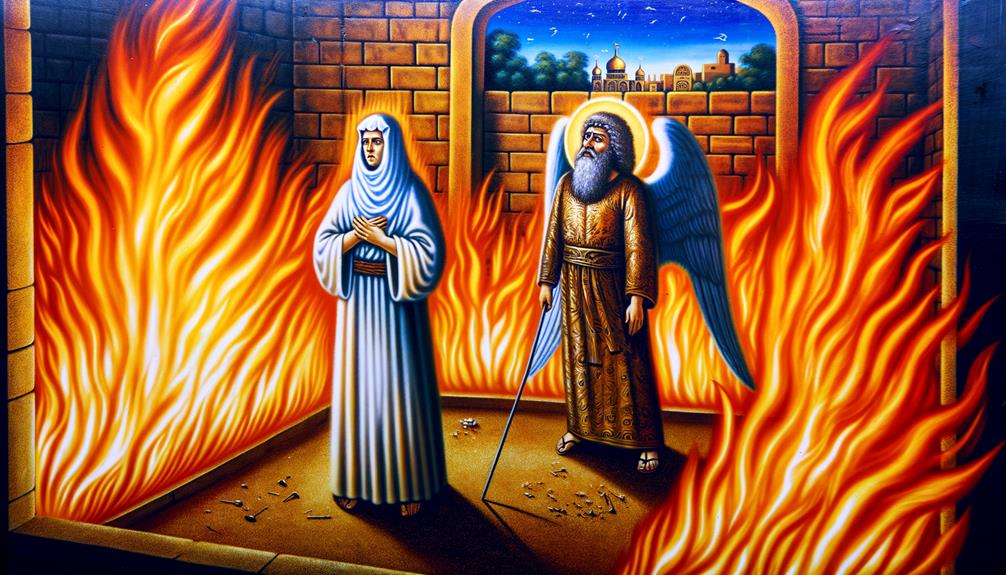
Religious teachings often emphasize how the story of Shadrach, along with Meshach and Abednego, embodies the principles of unwavering faith and God’s miraculous deliverance as seen in Daniel 3:16-27. This narrative is frequently highlighted to illustrate:
- Faith Under Persecution: Shadrach’s refusal to bow to Nebuchadnezzar’s idol, despite the threat of a fiery furnace, exemplifies steadfast faith (Daniel 3:18).
- Divine Protection: The miraculous survival of Shadrach and his companions, unscathed by the flames, underscores God’s power to protect His faithful (Daniel 3:25).
- Public Witness: Their deliverance served as a powerful demonstration to God’s sovereignty, compelling the king to acknowledge the supremacy of their God (Daniel 3:28-29).
These elements resonate deeply within religious teachings, offering timeless lessons in faith and divine fidelity.
The Legacy of Shadrach

The legacy of Shadrach is encapsulated in his unwavering courage in the face of a fiery trial, as depicted in Daniel 3:16-18. His steadfast faith under immense pressure exemplifies the profound trust in God’s sovereignty, even when confronted with potential death.
In addition, the divine protection granted to Shadrach, alongside his companions, underscores the miraculous intervention of God, affirming His ability to deliver those who remain loyal to Him.
Courage in Fiery Trial
Amidst the blazing furnace, Shadrach’s unwavering faith in God exemplifies the epitome of courage as recounted in Daniel 3:16-18. His steadfastness under King Nebuchadnezzar’s decree not only demonstrates an extraordinary level of personal bravery but also serves as a timeless testimony to divine deliverance.
Shadrach’s courage is illustrated through:
- Defiance of Royal Edict: He refused to bow to the golden image, adhering to the First Commandment (Exodus 20:3).
- Confidence in Divine Protection: He expressed unshakable belief in God’s ability to save (Daniel 3:17).
- Acceptance of God’s Will: He remained committed to God, regardless of the outcome (Daniel 3:18).
This narrative underscores the profound spiritual fortitude intrinsic to biblical faith and obedience.
Faith Under Pressure
Shadrach’s legacy, encapsulated in his resolute faith amidst Babylonian oppression, serves as a powerful reminder of unwavering trust in divine sovereignty, as demonstrated in Daniel 3:16-18.
When confronted by King Nebuchadnezzar’s decree to worship the golden image, Shadrach, along with Meshach and Abednego, boldly declared, ‘If it be so, our God whom we serve is able to deliver us from the burning fiery furnace; and he will deliver us out of thine hand, O king’ (Daniel 3:17).
Their steadfastness, even in the face of death, underscores a profound theological truth: genuine faith remains unshaken by temporal threats.
This narrative encourages believers to maintain their allegiance to God, irrespective of external pressures or imminent peril.
Divine Protection Granted
In a remarkable demonstration of divine intervention, Daniel 3:25 recounts the miraculous protection granted to Shadrach, Meshach, and Abednego as they walked unharmed in the midst of the fiery furnace. This event underscores the profound nature of God’s protection for those who remain steadfast in faith.
The legacy of Shadrach’s divine protection can be highlighted through three key aspects:
- Visible Presence: A fourth figure, described as ‘like a son of the gods,’ was seen walking with them (Daniel 3:25).
- Unharmed: Their bodies were untouched by the fire, with not even a hair singed (Daniel 3:27).
- Witness to Faith: King Nebuchadnezzar himself acknowledged the power of their God, leading to a decree honoring Him (Daniel 3:29).
This narrative illustrates the enduring legacy of unwavering faith and divine safeguarding.
Conclusion
The narrative of Shadrach, originating from the Hebrew name Hananiah, serves as a witness to unwavering faith amidst persecution.
His ordeal in the fiery furnace, as recounted in Daniel 3:19-27, symbolizes divine deliverance and steadfast belief.
Shadrach’s legacy, a beacon of resilience, resonates through religious teachings, underscoring the profound lessons of trust in divine providence.
Like a steadfast tree rooted by streams of water, Shadrach’s faith endures, inspiring generations to hold firm in their convictions.


